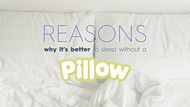Reasons Why It’s Better to Sleep Without a Pillow
Posted by Ethan Wright on 26th Nov 2020
Pillows are not just for your head and neck. Additional pillows can help keep your spine in a proper place depending on your sleeping position. But did you know that sleeping without a pillow is much better and healthier for you?
Though a pillow can support your head, sleeping without one can also prevent you from developing other ailments like wrinkles, neck pain, and spine related problems. When you sleep with a pillow that is way too high, you can put your neck into a position that causes muscle strain on your back, neck, and shoulders. If you are already suffering from any of these problems, it is best to ditch that pillow and sleep without one.
On the other hand, the pillow you sleep on should also be adjustable so that it allows you to sleep in different positions as for your comfort. If given a chance we’d say it is best and healthy to sleep without a pillow. It benefits the spine; it benefits the neck; it benefits the face over the course of time during the night. We tend to wrestle our face and bury it in the pillow. This habit is the leading cause of wrinkles.
Expert states that sleeping with a pillow hinders the quality of sleep. However, if you sleep without one, you tend to be more relaxed which thereby helps to improve the quality of your sleep.
====
Here’s what you can do with your pillow if you have the following body ailments:
Shoulder Pain
Avoid sleeping on the side with the painful shoulder. Sleep on your back. Or, if you sleep on the other side, place a big pillow at chest height and rest your arm on it, almost as if you’re hugging another person.
Back Pain
On your back, place a pillow under your knees or a rolled towel under the small of your back to maintain the body’s natural curve. In general, experts say sleeping on the back is best for this condition.
On your side, put a pillow between your knees for extra support. This is also good for people with hip and knee problems. A fetal-like position can help with lumbar spinal stenosis.
Sleeping on your stomach can be hard on your back and meck. But if you must, put a pillow under your pelvis and lower abdomen to help relieve strain.
Neck Pain
Try to keep the neck in a neutral position. Avoid sleeping on the stomach. Too many pillows can put your neck in a bent position. And keep the pillow above your shoulders. Some experts suggest using a rolled-up hand towel to support the neck.
Obstructive Sleep Apnea/Snoring
Sleep on your side or stomach to avoid the collapse of the tongue or tissues in the throat, which impairs breathing. One way to keep from rolling onto your back is to sew a tennis ball to the end of your pajama top.
Acid Reflux
Experts recommend elevating the head with pillows or raising the head of the bed by placing bricks under the front legs. Otherwise, sleep on your side.
Plantar Fasciitis
It’s important to keep your feet and ankles in a relaxed position with plantar fasciitis, an inflammation of the tissue on the bottom of the foot often caused by running or poor arch support. Avoid tucking in the sheets too tightly.
The information we share with you in this article should not be substituted for professional medical advice and opinions. Consulting your local doctor is still the best way to ensure proper healthcare and lifestyle.

